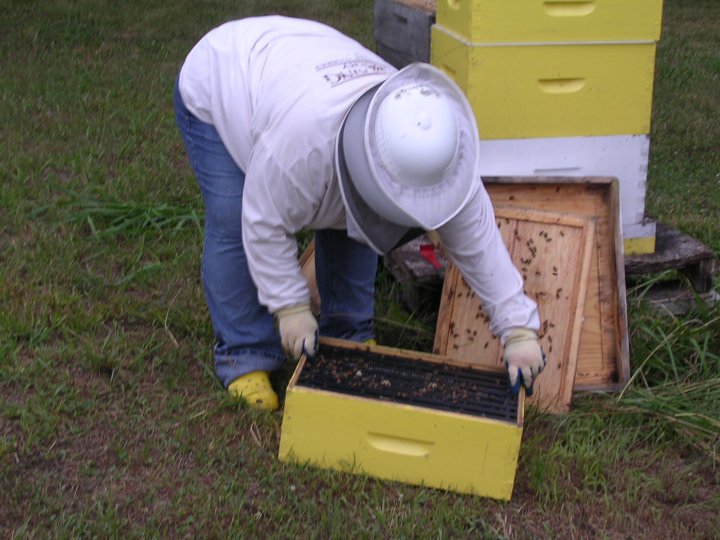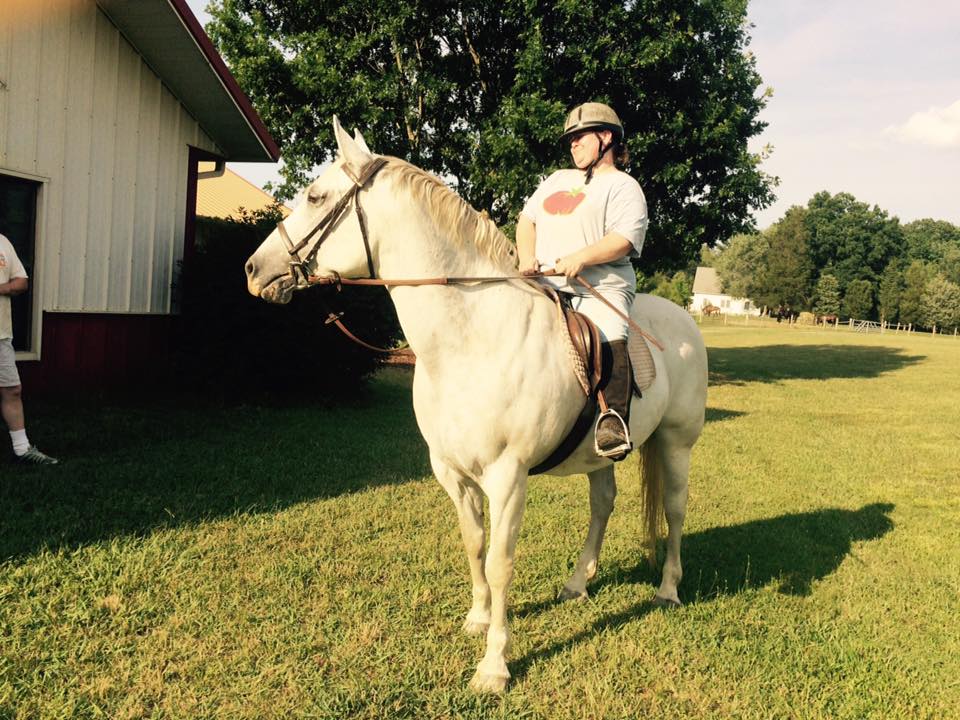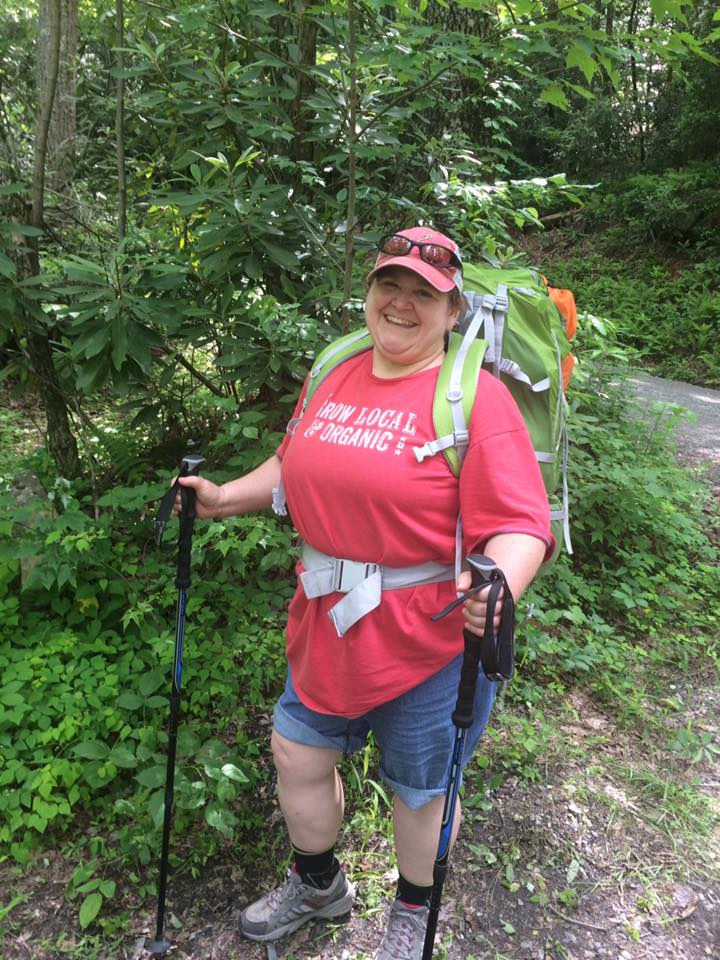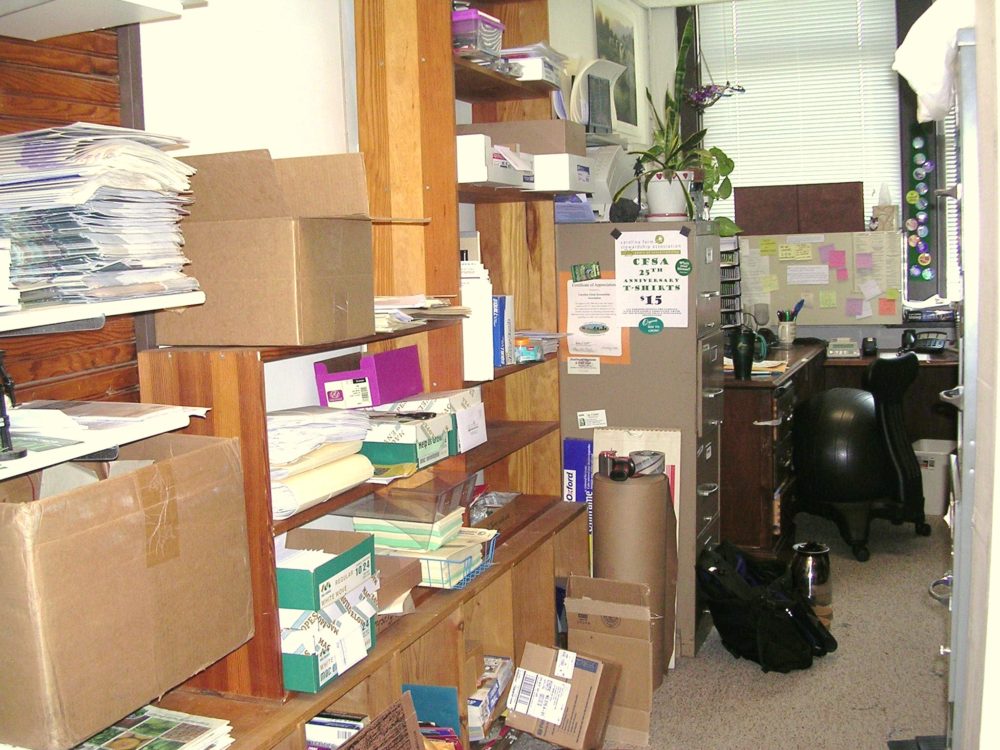by Ashley See, CFSA Communications Coordinator | Wednesday, Oct. 14, 2020 –
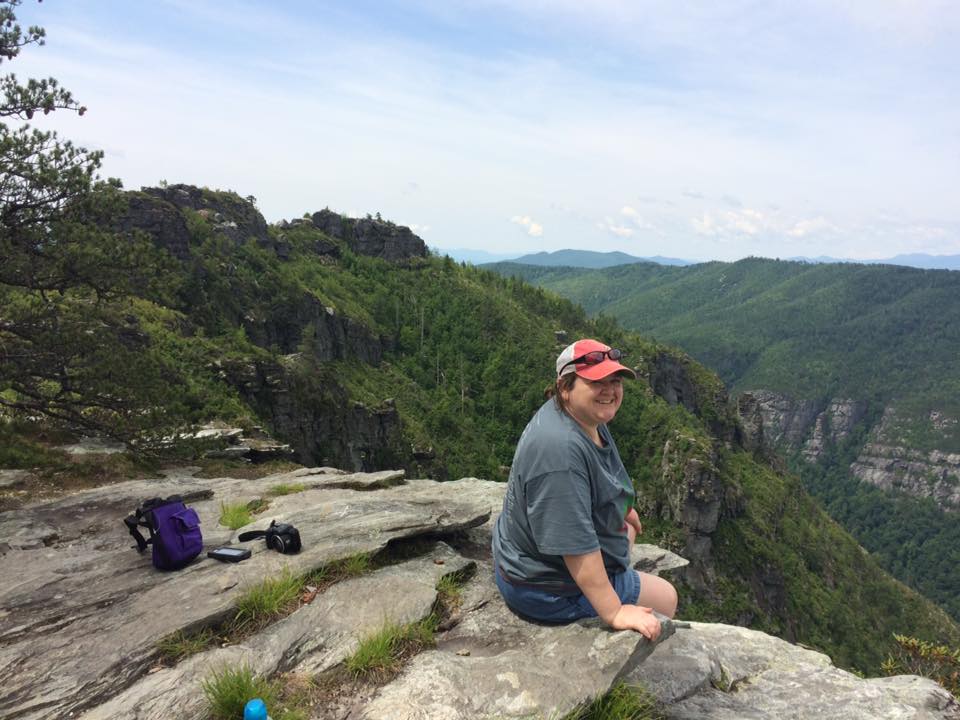
Here at CFSA, we’ve been wanting to give readers an opportunity to get to know our staff better. Beyond job titles and duties, what interests, passions, and hobbies do the staff of the Carolina Farm Stewardship Association have?
For this post in the series, we’re introducing Cheryl Ripperton Rettie, CFSA Finance, Administration, and HR Director. As CFSA’s most senior employee (14 years!), Cheryl is one of the few of us born and raised on a farm in North Carolina. While HR is in her title, make no mistake, she’s hardly the fun police. As the best hugger and storyteller on staff, Cheryl’s warm demeanor, legacy knowledge of our organization, and knack for finance are at the heart of CFSA.
Now that you’re loosely acquainted, we’ll hand it over to Cheryl.
Tell us your food story. What brought you to local food and farming?
I thought everyone lived that way and only went to the store for things they couldn’t grow or raise themselves.
Cheryl: I was born into it. My parents bought a farm in the 1960s soon after they were married, and when I was a kid it was a lot like homesteading. My mother has been riding horses since she was in high school, so that was and still is the main purpose for our farm, but we also had cows, chickens, ducks, geese, goats, rabbits, a small orchard, a huge kitchen garden, you name it.
When I was very young, I thought everyone lived that way and only went to the store for things they couldn’t grow or raise themselves. It was a bit surprising to discover that not everyone knew where their food came from or would freak out if it was something other than generic “hamburger” or “chicken.” We were warned not to tell our suburban school-age friends exactly what we were serving for supper, so they happily ate a lot of “chicken.”
Most of my previous jobs were food-oriented, too, either in restaurants or grocery stores, and a good number of my friends either started out or went into farming. I had known about CFSA for years from them, and when they told me about a bookkeeping job at CFSA, it was a perfect match–being able to use my non-farming talents to support something I love and believe in.
You’ve been at CFSA since 2006, which means you’ve worn a lot of hats throughout your 14 years here! What are some of the duties of your current position that delight you the most?
Cheryl: I have worn and continue to wear a lot of hats but my favorite duty is still the one I was first hired for: bookkeeping. I love that I got to know so many people while I was in charge of membership–and following their stories over the years–it’s like having a huge extended family.
I had a professor while I was getting my accounting degree who was absolutely appalled when I told her I loved accounting because it was just like art, with all its movement, balance, and flow.
The most delight, however, comes from creating systems that flow so smoothly in the background that nobody notices them. I really enjoy being the person behind the scenes who takes care of all the (supposedly) boring things so that everyone else can do the important flashy work. Bookkeeping, all that data entry, is soothing to me, so I look forward to days when I can just groove on making journal entries. And I love accounting in general: it makes me very happy and satisfied to take several little pieces of information, put them where they belong, and get a bigger picture. I had a professor while I was getting my accounting degree who was absolutely appalled when I told her I loved accounting because it was just like art, with all its movement, balance, and flow. Remembering the horrified look on her face still makes me laugh, and yet this used-to-be-an-art-major turned out to be the best student in her program, so I still think I’m right.
When you’re not keeping CFSA’s books immaculate or making sure everyone on staff has what they need, what does life outside of CFSA look like?
Cheryl: I still live on the family farm and have my own little kitchen garden, although it is terribly overgrown and neglected right now. I keep bees and have a big fat horse that I do not ride enough. I love traveling abroad and primitive camping, but since the pandemic, this has turned into hiking out into my own back forty and sleeping in a hammock on the weekends.
I love cooking and have learned lots of new cuisines from the countries I traveled to; the latest is from our trip to Thailand, and I treat my Mom to all sorts of spicy deliciousness. Since international travel is out right now, I am experimenting with every interesting item I can find while shopping, usually from the international sections of the grocery store (Mamey Sapote makes a delicious smoothie). I will gleefully try all sorts of odd foodstuffs; the chicken feet at SAC 2016 were particularly unusual & very tasty!
And I am a voracious reader. One of my favorite birthday presents was enough lumber to build floor-to-ceiling shelves on all four walls of a room, so I have an actual library to hold my 2500+ books. Even so, I had to make a rule for myself: I can only buy a physical book by authors who are currently in my collection. Everyone else has to go on the e-reader.
As someone who has been around for rapid growth at CFSA, we’re curious to learn what things were like when you joined the organization. Can you paint us a picture of how things were then compared to how they are now?
Cheryl: When I first started, CFSA was going through a pretty big transition. Tony Kleese was thinking about stepping down after many years of service as executive director, CFSA had stopped providing organic certification and was finishing up a grant-funded seed project, and although there were still farm tours and the annual conference, the organization was struggling financially.
I remember being excited when we reached 400 members – today we have 2,600!
There had been smaller regional member-groups who each had their own bank account, and those all needed to be accounted for. I remember driving all over the mountains of North Carolina doing farm visits for the mountain and high country farm tours; at one point, CFSA was running five annual tours!
I remember being excited when we reached 400 members – today we have 2,600!
CFSA now does much more direct service (consulting on high tunnels, CAP, GAPs) to our farmer members, but for a couple of years, we had all we could manage putting together events like the tours and on-farm dinners to educate the non-farming public about how important local and organic agriculture is.
Briefly, we were down to me and Roland (CFSA’s current executive director), and for a long time just two or three other people, so it was a lot of hands-on work for all of us. We were all generalists pitching in. Those were fun but sometimes exhausting times. Our work with farm tours was influential, since now all sorts of other groups put on tours, and agritourism is an additional part of many farms’ income streams, but I am really proud that CFSA has expanded to provide not only direct technical assistance but advocacy and collaboration with other sister-organizations to be an impactful voice for our members.
The CFSA office in 2007.
When I started, the office in Pittsboro was in a historic building. The floors were so uneven that when I moved my desk, all the drawers slid open and pencils rolled into my lap! We had compressed renting four rooms to two, which, by then, were so stuffed with materials and supplies that we had to walk sideways to get into them. Online stores were not a thing when I first started, so I often ended up staying at the office until midnight during SAC registration deadlines to answer the phones and take credit card information, which I then had to call into the processing center the next day and punch in using the phone keypad, one by one. We also used to print all of our own materials, from newsletters to conference brochures. I spent several nights dozing beside that old copier so I could keep feeding reams of paper into one end and remove finished booklets out the other. I can’t say that I miss that.
We all have something we’re hyper nerdy for. A little birdy told us that you love snakes. Where does this love come from and how is it currently cropping up?
Cheryl: I love snakes; I have always loved them. They are beautiful and feel wonderful when you stroke them, all those smooth scales. When I was a kid, I caught and kept a little green garter snake as a pet through the summer and would walk around with her in my hair or perched on my glasses.
When I was a kid, I caught and kept a little green garter snake as a pet through the summer and would walk around with her in my hair or perched on my glasses.
As an adult, I had a Burmese Python that I adopted from a roommate who couldn’t keep him. I named him Pip because I had Great Expectations of him, and sure enough, he grew from a mere five feet to eleven and a half feet long and was big enough around that you couldn’t circle him with your hands. Pip was the sweetest tempered fella, and my other more conventional pets (two dogs and two cats) had no problems with him. In fact, Pip would often be roaming around the house and crawl over a sleeping dog, and the dog would barely look up! When he was smaller, I would drape him over my shoulders and take him on hikes in the woods with my dogs. But as he got bigger and heavier, we couldn’t go on walks together, so he was only able to roam in the house freely or in the yard if I was watching him. There are many children (and adults!) who have fond memories of him. My friends would bring their kids out to the farm to meet and play with him, and when I took him to the Exotic Animal Vet in Raleigh for his checkups, all the techs would take their kids out of school to be there because he was so friendly and gentle–a wonderful introduction to snakes. You wouldn’t think a reptile would make a good companion, but he had a definite personality and was responsive. When Pip died in 2013, I was devastated; we had so many great years together, and I still miss him so much!
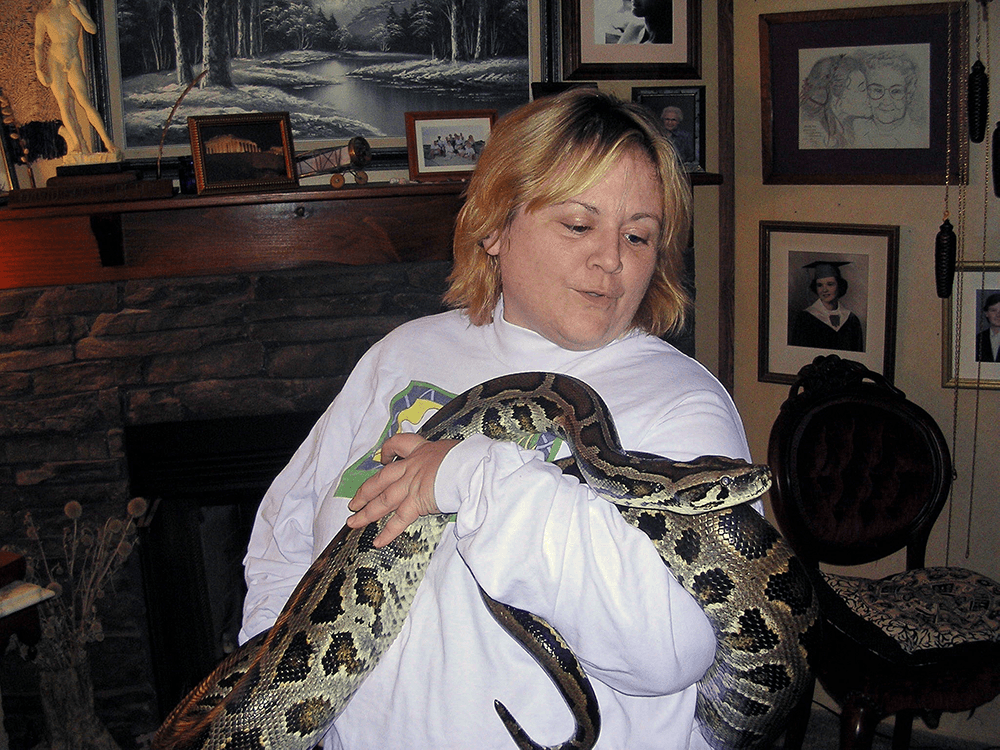
If you could have a farm anywhere and only grow and eat three crops (ignoring all practicality) where would it be and what would you grow?
Cheryl: I really love where I am and have such a deep attachment to the land I grew up on that I cannot imagine farming anywhere else. As for what I would grow: apples, garlic, and cherries.
I remember one of our apple trees (I think it was a golden delicious) used to produce ugly, lumpy, spotty, gnarly-looking fruits, but they tasted amazing. Most conventional types of apples in stores are so bland, I love getting regional ones like Arkansas black. So, if I could dream, I would grow my own. Cherries, especially Rainier cherries, are another impractical choice, but I love them so much. I gorge on them when they show up fresh from the West Coast. Maybe if I could grow them, I’d have enough cherries to bake pies, make preserves, or do anything other than gobbling them down fresh. Garlic is very practical; I find it easy to grow and use tons of it for cooking. You can never have too much garlic!
I really love where I am and have such a deep attachment to the land I grew up on that I cannot imagine farming anywhere else.
What are you reading right now and what recipe are you obsessed with?
Cheryl: Right now, I am re-reading the nine-book Temeraire series by Naomi Novik. I’m on book three, Black Powder War. These are alternate-history novels. Imagine a time during the Napoleonic Era with sapient dragons, and the British Royal Navy has an aviator division where dragons serve as flying armament with teams of humans riding aboard to do additional bombing and gunnery. The series goes all over the world, following the adventures of dragon Temeraire and his companion Captain William Lawrence. I love re-reading; it’s like getting to visit again with old friends!
I can’t say that I am obsessed with a recipe, but I was extremely proud of recently mastering the tadka (tempering of oil and spices), which is what makes masoor dal so delicious, and all the tricky steps in making traditional Persian jeweled rice. I’ve now made them each three times, and each time they came out tasting the same way, so I am very happy to count them in my repertoire.
Given the choice of anyone in the world, who would you want as a dinner guest?
Cheryl: Harlan Ellison, RIP, I love his work and admire him so much for being such an outspoken, irascible mess. He was hired by Disney and kicked out the same day, “You don’t joke about the mouse.” I love him for that! I don’t think I would want to spend much time with him–by all accounts he was a terribly combative personality–but listening to him kvetch about everything going on in the world over dinner and drinks would be a ton of fun if his writing is anything to go by.
I love that I got to know so many people while I was in charge of membership–and following their stories over the years–it’s like having a huge extended family.
Lastly, what do you wish folks in the food and farming community discussed more?
Cheryl: That’s a hard one. There are so many important issues, but I would say food apartheid. It’s fine if you have reliable transportation, but for those who don’t, access to healthy food is really limited. For example, other than a little convenience store at a crossroads where I can buy beer, chips, and the occasional can of Chef Boyardee, the closest groceries to my farm are about 10 miles away. It used to be further, but as the urban area is growing and sprawling outwards, real grocery stores follow. For still-rural but fairly well-populated places, stores such as Dollar General pop up, but I can’t really consider them a source of fresh, nutritious food. It seems terrible to me that the people and places that grow our food don’t have access to it themselves. And I remember living in urban areas without a vehicle, some places it was OK because I could get to the store by bike or bus, but in other places I lived, I often had to ask friends for a lift because it was either too far or on the other side of a busy highway.
Whether you want to hear more of CFSA’s history, have a question, or just want to say hello, Cheryl can be reached at cheryl@carolinafarmstewards.org.



